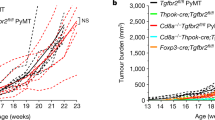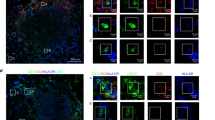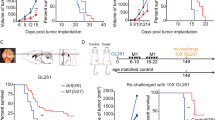Abstract
We investigated the antitumor effects induced by the production of interleukin-12 (IL-12) or IL-18, which influence the function of T helper type 1 cells, in murine colon carcinoma cells (Colon 26). Retrovirally transduced cells with IL-12 genes that encoded both p35 and p40 (Colon 26/IL-12) lost their tumorigenicity when inoculated subcutaneously or intraperitoneally into syngeneic immunocompetent mice. Moreover, the mice that had rejected the Colon 26/IL-12 cells generated protective immunity to wild-type (wt) cells when subsequently challenged. Colon 26 cells transduced with the IL-18 gene (Colon 26/IL-18) could not form subcutaneous tumors in immunocompetent mice, and the mice became resistant to inoculated wt cells. Immunohistochemical analysis revealed that the numbers of blood vessels in Colon 26/IL-12 or Colon 26/IL-18 tumors were markedly reduced, and that the expression of adhesion molecules such as intercellular adhesion molecule-1 and vascular cell adhesion molecule-1 increased on the endothelium in the stroma of Colon 26/IL-12 tumors. The loss of tumorigenicity of Colon 26/IL-12 or Colon 26/IL-18 cells was not observed in immunocompromised mice. However, the survival days of the immunocompromised mice inoculated with Colon 26/IL-12 but not Colon 26/IL-18 cells were significantly longer than those inoculated with wt cells. The secretion of cytokines that stimulate T helper type 1 cells from tumor cells can thereby induce an antitumor response. However, the effector cells involved in these antitumor effects could differentially migrate to the tumors, and the inhibition of angiogenesis may partially contribute to the antitumor responses observed.
This is a preview of subscription content, access via your institution
Access options
Subscribe to this journal
Receive 12 print issues and online access
$259.00 per year
only $21.58 per issue
Buy this article
- Purchase on Springer Link
- Instant access to full article PDF
Prices may be subject to local taxes which are calculated during checkout
Similar content being viewed by others
Author information
Authors and Affiliations
Corresponding author
Rights and permissions
About this article
Cite this article
Tasaki, K., Yoshida, Y., Maeda, T. et al. Protective immunity is induced in murine colon carcinoma cells by the expression of interleukin-12 or interleukin-18, which activate type 1 helper T cells. Cancer Gene Ther 7, 247–254 (2000). https://doi.org/10.1038/sj.cgt.7700094
Received:
Accepted:
Published:
Issue Date:
DOI: https://doi.org/10.1038/sj.cgt.7700094
Keywords
This article is cited by
-
Mucosa-associated invariant T cells infiltrate hepatic metastases in patients with colorectal carcinoma but are rendered dysfunctional within and adjacent to tumor microenvironment
Cancer Immunology, Immunotherapy (2017)
-
Immune killing activity of lymphocytes on Hela cells expressing interleukin-12 in vitro
Journal of Huazhong University of Science and Technology [Medical Sciences] (2008)
-
Effect of TGF-β1 on the expression of IL-12, IL-15, IL-18, IL-4 and IL-10 in heart transplantation rejection in rats
Journal of Huazhong University of Science and Technology [Medical Sciences] (2007)
-
Gene transfer of pro-IL-18 and IL-1β converting enzyme cDNA induces potent antitumor effects in L1210 cells
Leukemia (2004)
-
Secretion of interleukin-10 from murine colon carcinoma cells suppresses systemic antitumor immunity and impairs protective immunity induced against the tumors
Cancer Gene Therapy (2002)



